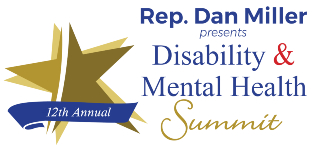Summit Primer
Virtual Kickoff Event – Performance Based Contracting
April 3, 2024 at 1 PM
Patrick DeMico and Nancy Murray
This session will focus on the Office of Developmental Program’s (ODP) Performance Based Contracting initiative, and its impact on people with intellectual disabilities/autism who receive residential habilitation, life sharing, supported living, and support coordination and their families. Performance Based Contracting seeks to enhance quality outcomes and improve the satisfaction of people supported and their families with preferred providers of residential services.
Continuing Education for sessions on May 8th
We have applied for sessions to be eligible for continuing education credit in a number of disciplines. Check back soon for updated approval information:
- Teachers (Act 48) – all sessions approved
- Social Workers, Licensed Marriage & Family Therapists, and Licensed Professional Counselors (CEU) – approvals pending
- Lawyers (CLE) – approvals pending
- Certified Rehabilitation Counselors (CE) – approvals pending
Breakout Sessions
The Alliance for Access and Assets: Building Financial Power Together
Alena Anderson
The Alliance is a vibrant and collaborative network of diverse organizations and individuals committed to increasing the financial security of people of color with disabilities. We host quarterly convenings to provide members with the opportunity to establish partnerships, share resources and develop strategies that foster economic self-sufficiency for people with disabilities. Please join us to learn more about the Alliance and how you can support our mission.
Building Bridges to Inclusion: Empowering Collaboration through Cities of Inclusion
Matt Aaron, Andrew Fee, and Nate Garland
Join us to explore the Special Olympics’ Cities of Inclusion Initiative, an effort to make communities fully inclusive for people with disabilities. This session will highlight how cities can unite organizations, businesses, and citizens across health, education, employment, and housing sectors to create environments where everyone thrives. Through real-world examples and innovative strategies, discover how Philadelphia is leading the way to become the first City of Inclusion, leveraging cross-sector collaboration, accessible programming, and groundbreaking initiatives like Unified Sports and reverse job fairs. Attendees will leave with actionable insights to bring these transformative ideas to jumpstart our efforts in Pittsburgh.
Centering Student Vision: Collaborative Transition Planning for a Future of Possibilities
Christie Cyktor, Stephen (Rick) Lipa, Maggie McMahon, and Jackie White
This session focuses on building a cohesive and collaborative transition plan for success. Effective transitions are driven by collaboration. When schools, students, families, and agencies work together, they lay the groundwork for a smooth and successful transition process. In this session, we’ll explore the essential elements of a collaborative transition plan and how it can be leveraged to benefit students with disabilities. Attendees will receive a comprehensive transition checklist, demonstrating how different team members can utilize it to ensure student success. The presenters will share their personal experiences, reflecting on how collaborative approaches and tools could have enhanced their own transition efforts and outcomes.
Community and Employment Issues in Neurodiversity
Johanna Murphy, MFA
This session will a cover a variety of issues and inequities embedded in the experience of neurodiverse (primarily autistic and ADHD) individuals as they navigate education, employment and society and, in so doing, will deliver a working understanding of neurodiversity in today’s society and workplace. We’ll cover the many barriers that neurodiverse people experience obtaining and keeping employment, as well other community issues that impact the neurodiverse disproportionately. We’ll walk through the outsized benefits of employing neurodiverse workers and contrast those against cultural assumptions, as well as history of the misconception of neurodiversity as a “deficit.”
Continuum of Interventions for Preventing Gun Suicide
Megan Andros and Mary Kenah
When someone is experiencing a suicidal crisis, their family members and friends are often the first to see signs. In such high-stakes emotional situations, it can often feel like there is nothing they can do, but working with a loved one to reduce access to guns can be life-saving. Panelists will discuss Everytown for Gun Safety’s Continuum of Gun Access Interventions for Preventing Gun Suicide, the current legal context, and the accompanying life-saving legislation that is needed in Pennsylvania.
Critical Connection: What to Expect When Contacting 988
Christine Michaels, MSHSA
The 988 Suicide and Crisis Lifeline launched in July 2022. Since then, it has received more than 10 million calls, texts, and chats. While awareness is growing, many people are still confused about 988. How is it different than 911? What happens when you call, text, or chat? When should you reach out? Join Christine Michaels, CEO of NAMI Keystone Pennsylvania, who will answer these questions as she walks participants through the 988 process and explain what – and who – is involved.
Disability Benefits 101: Understanding and Navigating Social Security Disability and VA Disability Compensation
Michael Quatrini, Esq.
Understanding the Social Security Disability and VA Disability compensation systems can be a daunting task. Join attorney Michael Quatrini to learn about the basics of how to navigate these complex systems. He will review eligibility requirements, what the application and approval process involves, what a typical timeline looks like, how to overcome challenges encountered along the way, and much more.
Disability Rights PA: Focus on Mental Health Rights
Monica Albert Still and Brynne Madway JD
This session will explain the role Disability Rights PA (DRP) has in protecting the rights of people with mental health issues. Your rights as a patient if you are receiving mental health services will be presented and discussed, and we will describe the process of how to access DRP if you feel your rights are being violated. We also will briefly discuss how the changes in guardianship laws affect people receiving mental health services. Finally, we will discuss how the goals of DRP’s mental health arm are driven by the community. We will discuss the role of the Mental Health Advisory Council (MHAC) within DRP and provide information about how community members can become involved in the MHAC.
Early Intervention Transition: The Children are Small, but it’s still a BIG Transition
Ashley Harland
Transition means change. In the Early Intervention (EI) system, transition occurs up to two times in a family’s first 5 years of receiving services. Transition occurs between Infant/Toddler EI (0-3, Part C) and Preschool EI (3-5, Part B) and again between Preschool EI and School Age (K-12) special education. While there are multiple system regulations and timelines to support seamless EI transitions, parents’ lived experiences range from excitement and joy to confusion and fear. In this session, a blend of traditional presentation and personal storytelling by parents will be used to help participants more fully understand the complexities and lived experiences of Early Intervention transition.
Empowering Black Youth: Navigating Mental Health and Community Support
Aleta Barnett and Ikeya Craig-Swatson
This session will highlight the importance of community support, creating safe spaces, fostering resilience, and accessing resources that promote mental wellness in black youth. There will be a presentation and then an opportunity to hear directly from a young person about the unique challenges black youth face, including societal pressures, cultural stigmas, and the impact of systemic barriers.
The Importance of Cultural Competence in Healthcare
Monica Ruiz
An essential element of providing high-quality healthcare services is providing care that is culturally competent. During this discussion, we will identify best practices on providing services to immigrant and refugee communities. There will be a focus on cultural and linguistically appropriate services that should be provided.
Police Interactions at the Intersection of Race and Disability: Common Concerns and Strategies for Increasing Success
Luciana Randall
Hear from a local self-advocate living at the intersection of being Black and autistic as he shares his perspectives developed over years of working. He has developed insights as a volunteer on the board of Autism Connection of PA, and as a public speaker on race and disability issues, in addition to his jobs as a grocery worker and library clerk. We will also hear from Lu Randall, Executive Director of the Autism Connection of PA, who has been a law enforcement instructor for many years, helping people understand aspects of hidden disabilities. She will discuss how these may look to an officer, and teaching adaptations to victim witness interviews, interactions with suspects, the message to slow down, give more space, and keep cover.
Politics and Governing with a Diagnosis
Representatives Jess Benham, Emily Kinkead, Brandon Markosek, and Abigail Salisbury
Join us for an intimate discussion about what it’s like to enter the public arena as a person with a diagnosis. We will hear from successful self-advocates who have run for office, won their races, and undertaken the task of governing. They will be sharing how their diagnosis has impacted their political experience, both positively and negatively, as well as discussing the hurdles and stigma they needed to overcome. Finally, they will explore what challenges still need to be addressed in order to build a more inclusive landscape.
Recognizing Autism with Catatonia: Real-life Insights, Warning Signs, and Misdiagnosis from a Caregiver’s Perspective
Lesley Pizone and Robin Stein
This session will explore the often-overlooked connection between autism and catatonia. Participants will gain valuable insights from real-life caregiver experiences to identify critical signs and symptoms and understand how to address common misdiagnoses to support individuals in a variety of settings.
Smart Home Technology – Improving Independence for People with Mental, Intellectual or Physical Disabilities
Christina Kraemer and Christina Lawley
This session will describe various Smart Home technologies and how technology can be an essential component in the lives of people with physical, intellectual and behavioral disabilities. Examples of technology that may be included are passive sensors, weight sensors for sofas, beds and chairs, flashing lights, voice-activated assistive technology, technology targeted to kitchen safety, elopement, and safety in the community and more. Attendees will also learn about Remote Support services, and there will be a discussion of possible funding options for the technology.
Stuttering: Progress Made and Navigating the Future
Representative Brandon Markosek and Dr. Seth Tichenour
Join Rep. Brandon Markosek and speech-language pathologist Dr. Seth Tichenour as they detail what it’s like to stutter, the challenges, misunderstanding, and stigma that are commonly encountered, and how Act 104 of 2023-34 (Rep. Markosek’s House Bill 2268) will help to improve access to care. They will also discuss other speech disabilities and disorders and will consider how the future can be improved in relation to social development, employment, and education.
What’s Wrong with our Mental Health System?
Dr. Doug Henry
The chaperoneless economics of medical care in the United States have sculpted our current medical system – one that is disparate, expensive, fragmented, and yields only average, or slightly below average (for developed nations), population health results. Our approach to mental health care and intervention is perhaps the best example of this phenomenon which has badly injured, and restrained progress in psychiatry and mental health care.
Specifically, a system that rewards aggressive utilization management such as exclusions and denials on the payer side, while rewarding volume on the provider side by using fee-for-service reimbursements as opposed to outcome-based, or value-based (really, health-based) reimbursements, has led to the formation of a system that works well for hospitals and insurance companies, but one that performs inconsistently for patients, communities, and even for the physicians that it employs. The purpose of this talk is to evangelize the need for incentivizing health. In mental health, that means demanding exclusively evidence-based, measurement-based services, and no longer tolerating anything else.
Legislative Panel
Supporting Families with Children with Complex Medical Needs
Special Education for Kids in Care
Transforming Mental Health Care Access through Prescribing Privileges for Psychologists

